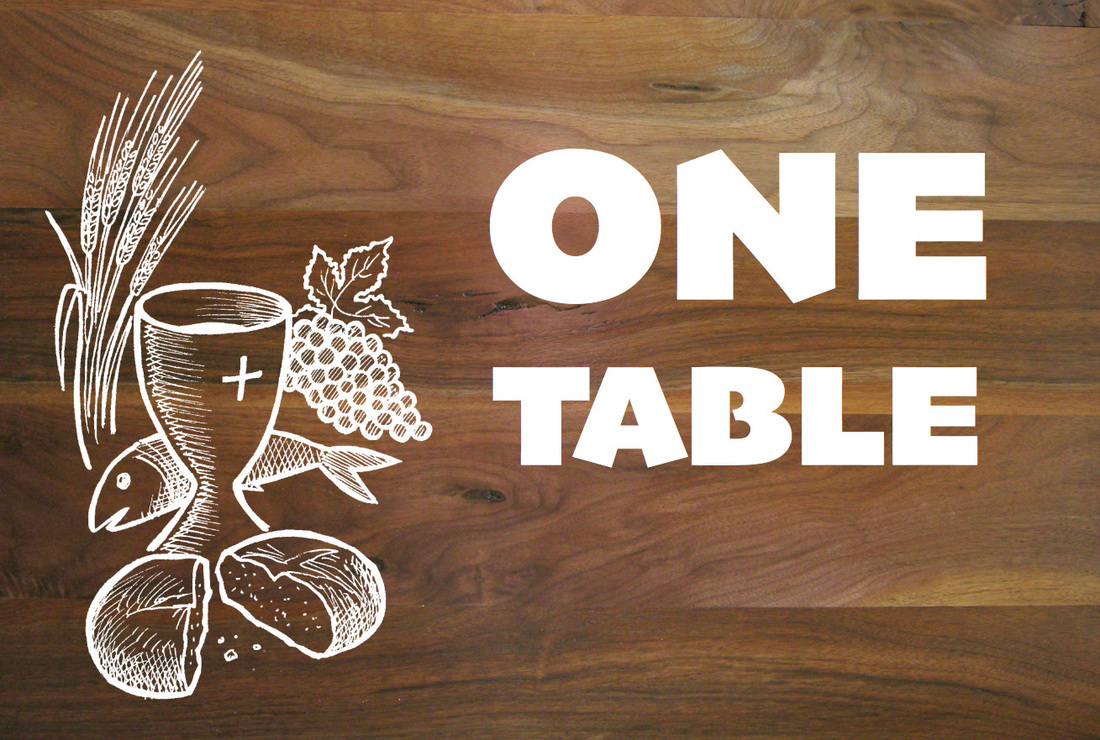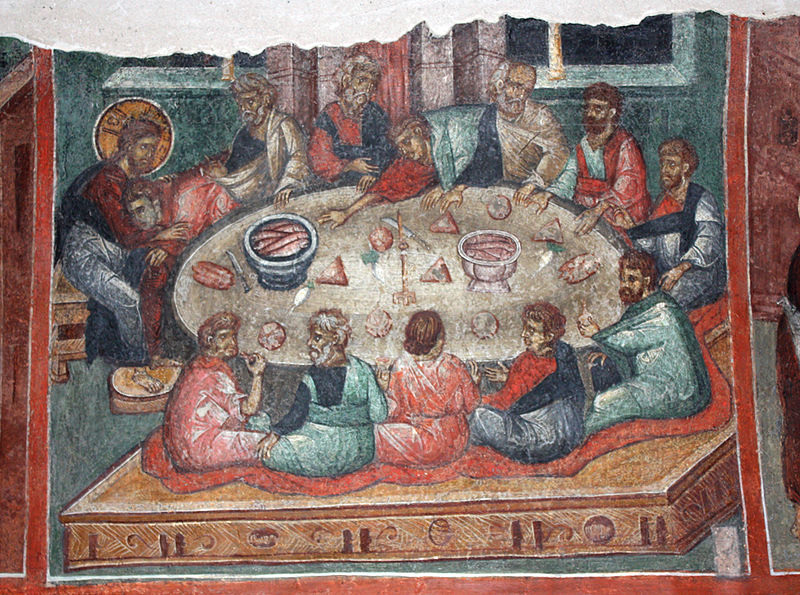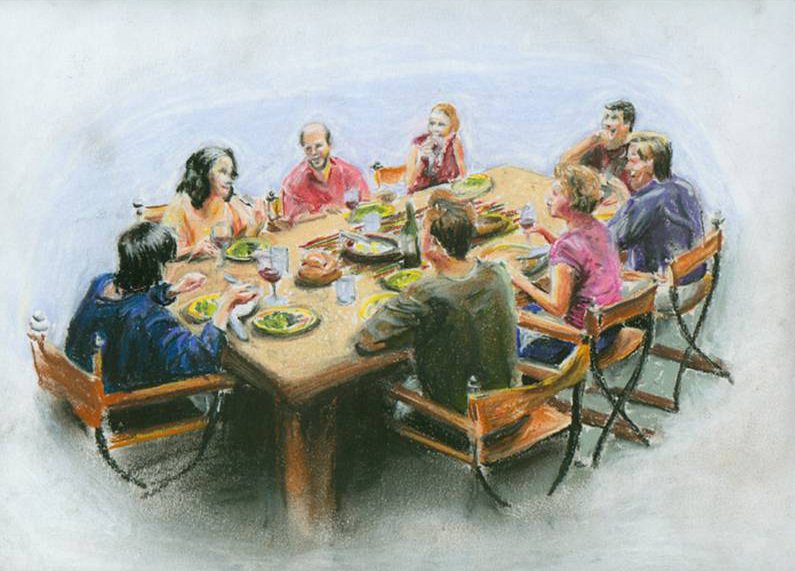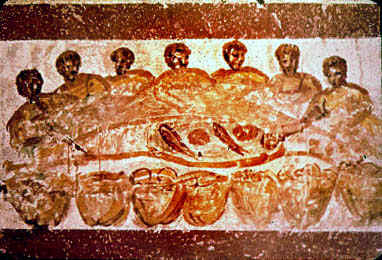How To Have SupperShared meals were an essential part of Jesus' ministry, and the basis for our sacrament of the Eucharist. As Christians following Jesus' example, we gather together at One Table.
But many of us have lost the art of the shared meal. We eat together less frequently and spend less time doing so. Why was supper so important to Jesus, and how can we reclaim it as Christians? |
Meals Were (Very) Important to Jesus
How Jesus Used MealsJesus used meals as opportunities to teach and witness to a new way, the way of God's kingdom. He challenged social norms in a way that ultimately got him killed. He used meals to:
Meals in the Gospel of LukeTen meals serve as key turning points in Jesus' ministry in the Gospel of Luke. Some suggest that the meal is the the organizing structure for the whole Gospel. New Testament scholar Markus Barth says, "In approximately one-fifth of the sentences in Luke’s Gospel and in Acts, meals play a conspicuous role." Robert Karris, another Scripture scholar, says, "In Luke’s Gospel Jesus is either going to a meal, at a meal, or coming from a meal."
Jesus Left us a MealJesus chose a symbol to leave behind, to help us recall him and the community to which we belong. He didn't leave behind a theology system, a moral code, a textbook, or even an organized church. He left behind a meal.
Then He Came Back to Eat!When Jesus rose from the dead, he was apparently very hungry. He:
|
[T]he Son of Man has come eating and drinking, and you say, "Look, a glutton and a drunkard, a friend of tax collectors and sinners!" Jesus, in Luke 7:34 (NRSV)
At dinner, Jesus took bread and wine, the commonly available, everyday elements of a meal in that time and place. He then broke the bread and poured the wine both to remind his disciples of his life and teachings and to serve as an invitation to follow his acts of love and compassion. Michael Shut, "Food As Sacramental"
Food & Faith: Justice, Joy, and Daily Bread |
What Are Our Mealtimes Like? |
How Often Do We Eat Together?Number of families with children who eat together as a family:
How Much Time Do We Spend Together?
National Center for Substance Abuse at Columbia University.
|
How Having Supper Is Different (and Christian)
|
Jesus taught us how to have supper. When he ate, he was present to others at the table. It wasn't about efficiently eating food, but about community, friendship, healing, and much more.
In fact, if we don't eat supper together--with our family, friends, neighbors--we really can't understand what Jesus was talking about or calling us to do. "Wasting" Time TogetherHaving supper together means making time to be truly present to one another. In our overscheduled world, we can become caught up in doing everything as quickly and efficiently as possible, but this was definitely not Jesus' way. Instead, we need to remember how to ask about what is important, listen to each others' hearts, support each other, and share laughter.
Making a HomeThe Church lives in individual households, and a big part of sharing supper together is the art of homemaking. Faith is not lived out in the parish, but in our homes and everyday lives. How do we make the places we live into a place with a sense of belonging, welcoming, warmth, joy, and love? And how do we share this work together?
Not Just For Families with KidsThis Christian call is for everyone, not just those with children or living in some kind of community. Living alone is a relatively modern experience, and it was relatively rare as recently as fifty years ago. Sharing supper can be a bigger challenge for those who live alone, but is just as important for them to reach out to others for community meals.
|
This may sound too simple, but when you cook and dine with others on a regular basis, reconciliation happens naturally. You simply cannot eat at table with people with whom you're on the outs. And when you dine together, a sense of agape (the early Christian love feast), emerges very quickly. You start to get the sense that some large non-verbal communication of love is going on that is not possible in any other context. Bill Huebsch
|
Family Dinner Hour "Sacrosanct" in White House, Our House
|
by Cathy Robbins
A New Yorker story recently described the first family's dinner hour as "sacrosanct." As I have learned, our own family's dinner hour has resonated across time, space and generations. The conversation began innocuously enough on my daughter Carla's Facebook page. "I have always felt it was important to get a nice dinner on the table for my family, but recently I am wondering if the effort is worth it," she posted. Then Carla sparked an ember that within hours spread across cyberspace... |
Listen to the Science
|
In addition to our faith-based motivations, scientific studies have reinforced the many positive effects of having supper together. Shared family meals have been shown to correlate with:
Learn more here: |
How To Have Supper
Sharing supper in our modern society only happens without some commitment and probably some sacrifice. If you dine together, Christ will be in your midst. It was in the breaking of the bread that the disciples recognized the risen Jesus on the road to Emmaeus.
Make It Happen
Prepare the Meal
|
At the Meal
After the Meal
|
Action Steps
Here are some ideas for how you can live out this message in your life this week.
Question of the WeekHow can I have supper this week the way Jesus taught us?
|
Have SupperLook at the tips above about "How to Have Supper" and make a commitment to sharing meals together differently this week (and month).
|
Watch Babette's FeastThe 1987 Danish film celebrates the power of a shared meal. It won the Academy Award for Best Foreign Language film. (IMDB)
|
Learn MoreFind more videos, books, and resources--especially for families with children--at the How to Have Supper page at GrowingUpCatholic.com.
|
Get Updates |
Feedback |





